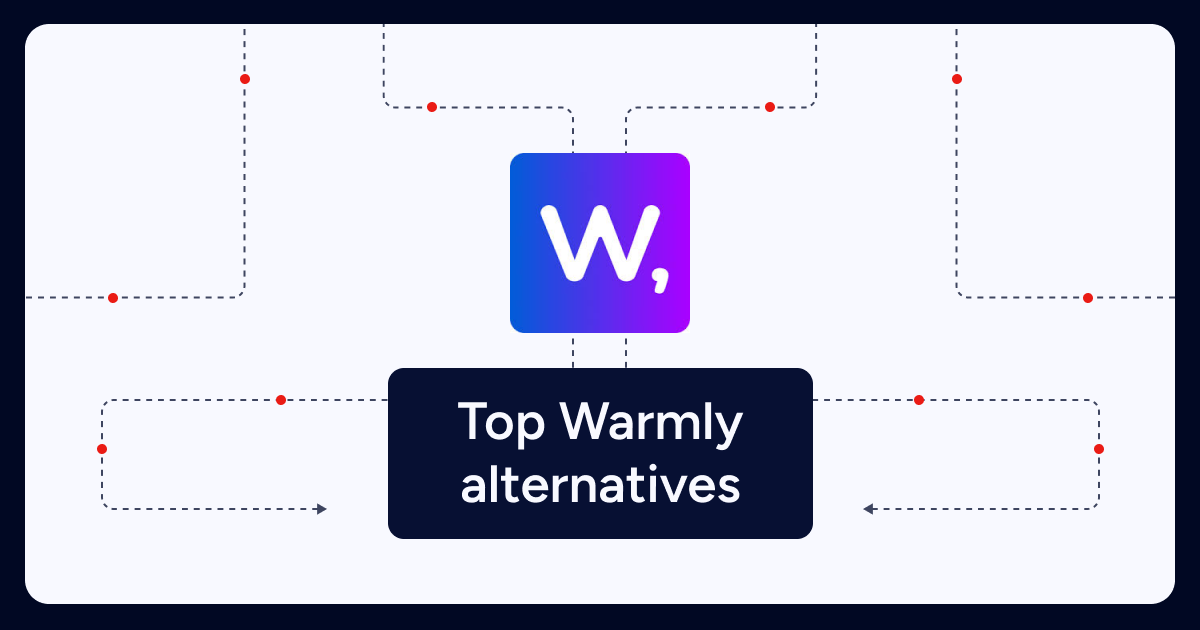Revenue teams need fast, reliable ways to identify website visitors, segment by fit and intent, and trigger timely outreach. Website visitor identification platforms connect the dots across firmographics, contact data, and buying signals so sales and marketing can prioritize the right accounts and convert more pipeline.
Warmly delivers value for teams focused on person-level identification and on-site engagement. But as organizations scale, they often need deeper data enrichment, broader global coverage, or more comprehensive intent signals. Some teams outgrow Warmly's pricing model or require tighter integration with enterprise CRM and marketing automation systems.
This guide ranks the top Warmly alternatives based on market research, user reviews, and expert analysis. We evaluate each platform by data quality, intent signal depth, CRM compatibility, and fit for different GTM use cases.
What Is Warmly?
Warmly is a website visitor identification platform that reveals individual contacts browsing your site and enriches them with firmographic data. It connects web engagement signals to CRM and marketing automation systems so B2B teams can prioritize in-market accounts and trigger timely outreach.
Core Capabilities:
Visitor deanonymization to identify companies on your site
Data enrichment to add firmographics and key attributes
Alerts and routing to SDRs when high-fit accounts engage
Integrations with common CRMs and MAPs for synced workflows
Typical Strengths:
Person-level identification rather than company-only matching
Real-time alerts and on-site engagement features
Focused on signal-based orchestration for SDR and marketing teams
Reported Limitations:
Limited database depth compared to enterprise data providers
Pricing can scale quickly for high-traffic websites
Less comprehensive intent signal coverage than ABM-focused platforms
What Are Website Visitor Identification Platforms?
Website visitor identification platforms deanonymize web traffic, enrich account and contact records, and surface buying signals so teams can act with context. These platforms match anonymous IP addresses to company records and individual contacts, then layer on firmographic data, technographic insights, and intent signals.
For GTM teams, visitor identification platforms turn website traffic into actionable pipeline. Marketing teams use them to build targeted audiences and trigger ABM plays. SDR and BDR teams rely on real-time alerts to engage high-fit accounts while intent is fresh. Revenue operations teams use the data to maintain CRM hygiene and route leads efficiently.
These platforms deliver value by:
Revealing who's on your site and what they care about
Enabling targeted, timely outreach and personalized experiences
Surfacing actionable insights to prioritize accounts and sequences
Connecting marketing, SDR, and sales teams with shared intelligence
Core capabilities to expect from website visitor identification platforms:
Visitor identification and account enrichment
Multichannel engagement (chat, email, sequences) and routing
AI-driven recommendations and predictive prioritization
Deep CRM/MAP integration for data hygiene and workflows
Analytics and reporting on intent, pipeline, and revenue impact
These capabilities matter because they determine how quickly your team can act on website traffic and how accurately you can measure downstream revenue impact.
Top 10 Warmly Alternatives and Competitors

1. ZoomInfo
ZoomInfo offers the most complete go-to-market platform on the market. It combines the industry's largest B2B contact database with real-time intent signals, conversation intelligence, CRM enrichment, and AI-driven prospecting from ZoomInfo Copilot.
Sales teams report significant gains in pipeline creation, research efficiency, and outreach performance after switching from Warmly to ZoomInfo.
Key Features:
400M+ verified contacts and advanced filters
AI-powered Copilot for prospecting, meeting prep, and email drafting
Real-time buying intent and trigger alerts
CRM integrations (Salesforce, HubSpot, Outreach, more)
Conversation intelligence and sales engagement tools
Data orchestration and automated workflows
Apricorn, a leading data security hardware manufacturer, used ZoomInfo to identify and engage high-value accounts. The result: a more targeted approach that improved pipeline quality and accelerated deal velocity.
ZoomInfo Copilot: AI That Sells With You
ZoomInfo Copilot is the AI assistant embedded within ZoomInfo. It helps revenue teams:
Discover in-market accounts
Write better emails faster
Prep for meetings in seconds
Revive lost deals
Surface talking points automatically
Copilot eliminates manual research and lets reps focus on selling instead of prospecting busywork.
Learn More About ZoomInfo Copilot
Quick Comparison: Top Warmly Alternatives
Platform | Best For | Primary Strength | Key Differentiator |
|---|---|---|---|
ZoomInfo | Enterprise GTM teams | Largest B2B database with AI Copilot | 400M+ verified contacts with real-time intent signals |
RB2B | US-focused teams | Person-level identification | Slack integration with instant alerts |
Qualified | Pipeline generation | Conversational experiences | Salesforce-native with AI SDR qualification |
6sense | ABM programs | Account-level intent predictions | Buying-stage identification and prioritization |
Demandbase | Enterprise ABM | Account intelligence and personalization | Integrated advertising and site customization |
This table highlights positioning differences across the top Warmly alternatives. For complete feature details, see individual platform sections below.

2. RB2B
Teams comparing RB2B vs Warmly often evaluate both for person-level visitor identification. RB2B is a person-level visitor identification tool that reveals individual contacts (not just companies) browsing your site, with real-time Slack alerts for US-based traffic.
Key Features:
Person-level deanonymization
Slack integration for real-time alerts
Hot Leads feature to tag ideal customer profile visitors
US visitor focus
Tracking pixel implementation
Free tier available
Positioning Notes:
Excels at person-level identification for US traffic
Integrates directly with Slack for instant notifications
Limited to US-based visitors
Less enrichment depth than enterprise platforms
Unlike ZoomInfo, RB2B focuses primarily on US-based visitors and lacks the global database coverage and intent signal depth that enterprise teams require.

3. Qualified
Qualified focuses on pipeline generation with website chat, conversational experiences, and AI SDR. Qualified helps revenue teams identify visitors, route them to sales, and launch conversations on site.
Key Features:
AI SDR qualification
Visitor identification and routing
Salesforce integration and reporting
Targeted chat, meeting scheduling, and alerts
Positioning Notes:
Excels at conversational pipeline generation
Salesforce-native approach with deep CRM integration
Playbooks support targeted experiences by segment or account list
However, Qualified focuses primarily on chat and conversational experiences rather than the database depth and intent signals found in ZoomInfo.

4. 6sense
6sense surfaces account-level intent, buying-stage predictions, and prioritization. 6sense aggregates behavioral signals and anonymous research to identify in-market accounts.
Key Features:
Account intent and buying-stage predictions
Prioritized account lists and alerts
Buying team insights and topic interest
CRM and sales engagement integrations
Positioning Notes:
Excels at account-based marketing and intent-driven targeting
Predictive analytics for buying-stage identification
Sellers can view buying teams, topics, and recommended next actions
Syncs account insights into CRM and sales tools

5. Demandbase
Demandbase offers an ABX platform with account intelligence, website personalization, and advertising. Demandbase Account ID matches anonymous visitors to known accounts.
Key Features:
Account intelligence and intent
ABM advertising and site personalization
Analytics and attribution
MAP/CRM integrations
Positioning Notes:
Excels at enterprise ABM programs
Account selection and intent-driven targeting
Tailored web experiences based on visitor attributes
Insights sync to MAP/CRM for orchestration and attribution

6. Clearbit
Clearbit provides data enrichment and visitor identification. Clearbit Reveal matches web traffic to companies, while enrichment updates firmographic and technographic attributes across systems.
Key Features:
Visitor identification
Company and contact enrichment
Segmentation and routing based on fit and intent
Integrations with CRM and MAP
Positioning Notes:
Excels for HubSpot users (now owned by HubSpot)
Strong data enrichment capabilities
Marketers use the data to trigger campaigns and tailor forms, chat, and content
HubSpot-centric positioning and native integration

7. Apollo
Apollo combines a large B2B database with sequencing and deal workflows. Apollo provides contact discovery, website visitor account ID, list building, and campaign workflows.
Key Features:
B2B database with contact and company coverage
Built-in sequences
Chrome extension and workflow automations
CRM and inbox integrations
Positioning Notes:
Excels at combining prospecting database with outbound workflows
Enrichment and basic intent indicators feed routing and prioritization
Integrations with major CRMs and email providers support handoffs
Popular with SMB and mid-market teams

8. Cognism
Cognism is a B2B sales intelligence platform with strong European coverage and GDPR compliance, offering phone-verified mobile numbers and intent data. Teams focused on EMEA markets use Cognism for compliant prospecting with high-quality contact data.
Key Features:
Diamond Data phone-verified mobile numbers
GDPR compliance and consent management
European market coverage
Intent data and buying signals
CRM integrations
Positioning Notes:
Excels for EMEA-focused teams
Compliance-first approach with GDPR workflows
Phone number accuracy with Diamond Data verification

9. Dealfront
Dealfront delivers European-focused go-to-market intelligence with visitor identification and prospecting. It combines site visitor reveal with targeting and compliance-minded workflows for EMEA teams.
Key Features:
Visitor identification
EU coverage emphasis
Company data, triggers, and segmentation
Lead routing and CRM integrations
GDPR-conscious workflows
Positioning Notes:
Excels for European market focus
Users segment by industry, size, or territory
Sync insights into sales tools with GDPR compliance
Formed from Leadfeeder and Echobot merger

10. Lead Forensics
Lead Forensics specializes in identifying anonymous B2B website visitors and turning them into leads. Lead Forensics matches IP traffic to company records to provide firmographic context and engagement details.
Key Features:
Visitor identification from IP signals
Firmographic enrichment and activity tracking
Alerts and lead assignment
CRM/MAP connectivity
Positioning Notes:
Excels at IP-based visitor identification
Reporting, alerts, and integrations prioritize follow-up
Established player in website visitor identification space
Learn More About Lead Forensics
Is There a Free Warmly Alternative?
ZoomInfo Lite is the #1 free alternative to Warmly
ZoomInfo Lite gives users free access to verified contact and company data, Chrome-based prospecting, and monthly credits for outreach. It's powered by the same data engine as ZoomInfo but available at no cost.
Key Capabilities:
Verified emails and phone numbers
Real-time data accuracy
Chrome extension
CRM integrations
Exportable contact lists
Learn more about ZoomInfo Lite
How to Choose the Right Warmly Alternative
SMB teams and individual contributors often prioritize affordable options with straightforward pricing and quick setup. Enterprise GTM teams need comprehensive stack capabilities: deeper data coverage, advanced intent signals, and tight integration with existing CRM and marketing automation systems.
Key evaluation criteria when comparing Warmly alternatives:
Data quality and match rate: High match rates and verified contact data determine how much of your traffic converts to actionable leads.
Intent signal depth: Real-time buying signals beyond basic website visits help teams prioritize accounts actively researching solutions.
CRM integration and workflow automation: Bi-directional data flow, automated enrichment, and lead routing determine speed to action.
Pricing and scalability: Understand how costs change as your website traffic and team size grow.
Use case fit: SDR prospecting, ABM programs, and revenue operations each require different platform capabilities.
Test two to three platforms with your actual website traffic and CRM data, measuring match rates, data accuracy, and time-to-action. ZoomInfo offers a complete, scalable stack backed by AI and customer results across thousands of high-growth teams. Talk to our team to see how ZoomInfo compares in your environment.
Warmly Alternative FAQs
What Is the Best Alternative to Warmly?
ZoomInfo provides the most complete alternative with data depth, intent signals, and AI-powered prospecting beyond basic visitor identification. RB2B and Clearbit serve specific use cases: person-level US traffic identification and HubSpot integration respectively.
How Does ZoomInfo Compare to Warmly?
ZoomInfo offers a larger B2B contact database, deeper intent signals, and AI-powered Copilot for prospecting and meeting prep. Warmly focuses on on-site visitor identification and chat-based engagement with person-level tracking.
Is There a Free Alternative to Warmly?
ZoomInfo Lite provides free access to verified contact and company data with Chrome-based prospecting and monthly credits. RB2B also offers a free tier for person-level visitor identification.
What Is the Difference Between RB2B and Warmly?
Both offer person-level identification, but RB2B focuses on US traffic with Slack alerts and Hot Leads tracking. Warmly includes on-site chat and orchestration features with broader geographic coverage.
What Should I Look for in a Warmly Alternative?
Start with data accuracy and match rates, then evaluate intent signal depth, CRM integration capabilities, and speed-to-action for your team. Pricing models and pipeline measurement capabilities matter most when you've validated core data quality.

